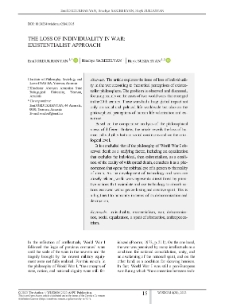Object
Title: The Loss of Individuality in War: Existentialist Approach
Journal or Publication Title:
Date of publication:
Volume:
Number:
ISSN:
Corporate Creators:
Խ․ Աբովյանի անվան հայկական պետական մանկավարժական համալսարան
Coverage:
Abstract:
The article explores the issue of loss of individuality in the war according to theoretical perceptions of existentialist philosophers. The problem is observed and discussed, focusing mainly on the cases of two world wars that emerged in the 20th century. These wars had a huge global impact not only on social and political life worldwide but also on the philosophical perceptions of human life valorization and existence. Based on the comparative analysis of the philosophical views of different thinkers, the article reveals the loss of human individuality both in social conditions and on the ontological level. It is concluded that if the philosophy of World War I observed death as a unifying factor, including an equalization that excludes the individual, then existentialism, as a condition of the reality of widespread death, considers it as a phenomenon that opens the spiritual eye of a person to the reality of death. As the development of technology and wars are closely related, world wars represent a direct threat by primitive nations that assimilate and use technology to absorb nations endowed with a peace-loving and creative spirit. This is a big threat to humanity in terms of its dehumanization and destruction.
Place of publishing:
Երևան
Publisher:
Format:
Identifier:
oai:arar.sci.am:372479
Language:
Object collections:
Last modified:
Oct 8, 2025
In our library since:
Apr 4, 2024
Number of object content hits:
83
All available object's versions:
https://arar.sci.am/publication/402353
Show description in RDF format:
Show description in OAI-PMH format:
-
Իմաստություն=Wisdom=Мудрость
-
Իմաստություն, 2013, N 1
-
Իմաստություն, 2014, N 1 (2)
-
Իմաստություն, 2014, N 2 (3)
-
Իմաստություն, 2015, N 1 (4)
-
Wisdom, 2015, N 2 (5)
-
Wisdom, 2016, N 1 (6)
-
Wisdom, 2016, N 2 (7)
-
Wisdom, 2017, N 1 (8)
-
Wisdom, 2017, N 2 (9)
-
Wisdom, 2018, N 1 (10)
-
Wisdom, 2018, N 2 (11)
-
Wisdom, 2019, N 1 (12)
-
Wisdom, 2019, N 2 (13)
-
Wisdom, 2020, N 1 (14)
-
Wisdom, 2020, N 2 (15)
-
Wisdom, 2020, N 3 (16)
-
Wisdom, 2021, N 1 (17)
-
Wisdom, 2021, N 1 (1) Special issue
-
Wisdom, 2021, N 2 (18)
-
Wisdom, 2021, N 3 (19)
-
Wisdom, 2021, N 4 (20)
-
Wisdom, 2022, N 1 (21)
-
Wisdom, 2022, N 1 (2) Special issue
-
Wisdom, 2022, N 2 (22)
-
Wisdom, 2022, N 2 (3) Special issue
-
Wisdom, 2022, N 3 (23)
-
Wisdom, 2022, N 3 (4) Special issue
-
Wisdom, 2022, N 4 (24)
-
Wisdom, 2023, N 1 (25)
-
Wisdom, 2023, N 2 (26)
-
Wisdom, 2023, N 3 (27)
-
Wisdom, 2023, N 4 (28)
- Editorial board
- Contents
- Editor`s Foreword
- The Philosophical and Legal Aspect of the Unified Information and Digital Area in the Eurasian Economic Union: The Fifth Freedom of the Single Market
- The Loss of Individuality in War: Existentialist Approach
- The Potential of Diaspora System-Building Investments in Homeland
- The Philosophical Interpretation of Risk Assessment in Municipal Project Management
- The Legal Education Culture of Young People: A Projection of the Future
- Retrospective Review of Higher Education Quality: Some Parallels Between Past and Present
- Floral Symbolism in Ukrainian Temple Art
- The Philosophy of the Concept “Privacy” in English and Chinese Linguoculture
- Philosophical and Theoretical Aspects of Court-Notary Interaction: Current Relationships in the Provision of Evidence
- Digital Arbitration Is a New Way of Dispute Resolution for the Unified Digital Space of the EAEU: Political, Philosophical and Legal Aspect
- Spatial Planning and Philosophy of Justice: Corrective Action on Commutative Justice Theory (A Study in Kalimantan, Indonesia)
- Methodology for the Study of the Principles of Establishing Territorial Jurisdiction and Mechanisms for Resolving Digital Disputes by the Courts of the International Financial Center of Dubai
- Three Philosophical Pillars of the 2022 Armenian Constitutional Revision: Empowerment of Public Discourse, Theory of Justice, and Environmental Ethics
- International Experience of Constitutionalization of Criminal Law Regulations Regarding the Creation of Elected Public Bodies
- The Philosophical and Legal Rationale for a Systematic Analysis of Digital Dispute Resolution Models in Modern Arbitration
- Shareholders’ Agreement in the Crossroads of Philosophy of Law
- Political and Philosophical Analysis of the Interpenetration of Public-Law And Private-Law Spheres of Regulation in the Activities of the Eurasian Economic Union
- Philosophical Foundations of the Transformation of the Judicial Method of Rights Protection in the Context of the Creation of a Unified Information Space of the EEU
- Complex Regional Unification of Private International Law Rules on the Base of a Three-Part Structure: Political and Legal Framework
- Integration Political and Legal Analysis of Dispute Resolution and Prospects for Digitalization of Justice in the Eurasian Economic Union
- The Political Impact of Digitalization on the Judicial Method of Protection of Rights in the EAEU Countries
- Review of the Monograph: Kolosov I. V. the History of Legal Consequentialism: The Effectiveness of Law
- To the 70th Anniversary of Kadzhik M. Oganyan
- Notes to Contributors
-
Wisdom, 2024, N 1 (29)
-
Wisdom, 2024, N 2 (30)
-
Wisdom, 2025, N 1 (31)
-
Wisdom, 2025, N 2 (32)
-
Իմաստություն, 2013, N 1
| Edition name | Date |
|---|---|
| Ordukhanyan, Emil, The Loss of Individuality in War: Existentialist Approach | Oct 8, 2025 |





